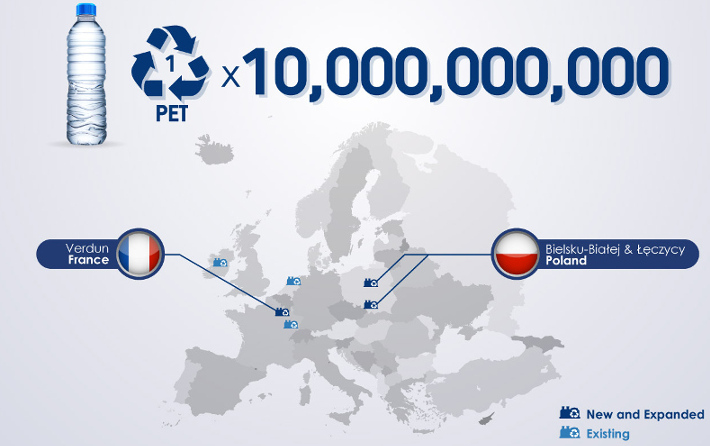Indorama Ventures expands facilities in France and Poland
10 billion post-consumer PET plastic bottles from across Europe will be recycled per year by 2023 in Indorama Ventures’ new and expanded facilities in Verdun, France and in Bielsku-Białej and Łęczycy, Poland. Thai-based Indorama Ventures Public Company Limited (IVL) is investing USD1.5 billion globally to expand its recycling facilities. The new investment, that will see over 1.7 billion additional post-consumer PET plastic bottles recycled, was welcomed by Unesda Soft Drinks Europe, whose members have committed to use recycled PET (rPET) in their bottles.
François LAGRUE, Head of Operations – Europe, Indorama Ventures Recycling Group said, “Combined with our existing European facilities, IVL will recycle almost 10 billion post-consumer PET plastic bottles in Europe per year, by 2023. This new expanded capacity will mean that, in our facilities alone, an extra 1.7 billion more bottles will be recycled in 2023, compared with 2020. This will lend significant support in realising the EU’s plastic collection and recycling targets.”
In 2019, Indorama Ventures announced it would be aiming for a minimum of 750,000 metric tons of rPET globally by 2025, investing up to USD1.5 billion to achieve this goal. IVL’s new plant in Verdun along with recent acquisitions in Bielsku-Białej and Łęczycywill work with their existing PET flake production facilities in Europe. Verdun will be commissioned in Q4 2021 and IMP Polowat’s facilities in Poland were acquired in October 2020. These provide the washed and shredded post-consumer bottles as PET flake feedstock to produce rPET resin that is suitable for food contact use. The input tonnage processed is equivalent to 9.8 billion post-consumer bottles.
Nicholas Hodac, Director General of Unesda Soft Drinks Europe said, “We welcome this investment in Europe’s circular economy. Europe’s soft drinks industry is working hard to drive sustainability throughout its value chain – from sourcing, production and distribution through to packaging, collection, recycling and reuse. This investment is another proof point that circularity works in Europe. By delivering a closed-loop system we ensure that valuable secondary raw material is not wasted and we achieve a well-functioning EU market.”
In 2018, UNESDA agreed a series of ambitions to make its plastic packaging more sustainable. This included using a minimum of 25 per cent recycled PET (rPET) content in bottles by 2025. As a result, investment in recycling has been stimulated and rolled out. Many Unesda members – including Suntory, PepsiCo and Coca-Cola – have gone further and announced ambitious targets for even more recycled content in Europe’s favourite soft drink bottles.

